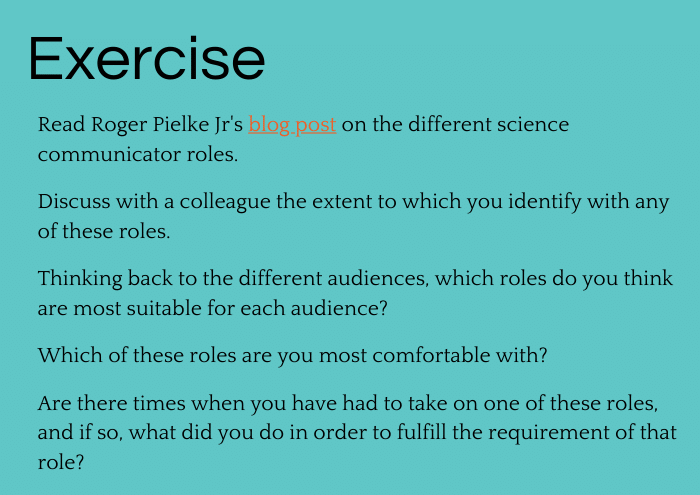Understanding how you are heard and finding your authentic voice
There are unresolved questions about what climate change communication is trying to achieve and who should be doing it, and as a result there is a huge amount of room for dispute, disagreement and contestation.
Is the purpose of climate change communication to:
- provide clearer presentation of the science of climate change?
- build public engagement (attitudes, behaviours) with climate change as a societal risk?
- give policy makers the information they need in order to make good decisions?
There is a growing expectation for scientists to communicate their research findings to the public.
This can be a concern for some climate scientists because the science has often quite explicit policy implications.
As a result the line between climate communication and advocacy can appear blurred.
In order to be effective communicators scientists need to reflect on what role they are comfortable with3:
- Pure scientist – someone who sits apart from society and just does their research. In reality, grant applications and funding comes with expectations of impact and relevance. In the end, no scientist can sit apart from the society of which they are a part of.
- Science arbiter – deciding what scientific information decision-makers need in order to be effective. Scientists may find themselves in this role when politicians have to make a decision which can, at least in part, be answered by scientific evidence.
- Issue advocate – pushing for a particular (set of) policy response(s). Alternative options are ignored or dismissed.
- Honest broker – provide all the options supported by the science, for others to decide how to use that information.

Working out what role is right for you
The content of these web pages draws on a series of workshops created and developed by Climate Outreach and the Tyndall Centre for Climate Change Research as part of the Helix project.
3 Pielke Jr, R. (2007). The Honest Broker: Making sense of science in policy and politics. Cambridge University Press.

